
IN A significant stride towards integrated workforce recruitment, Talent Corporation Malaysia Bhd (TalentCorp), a strategic think tank under the Human Resources Ministry (Kesuma), has rolled out a centralised digital ecosystem to streamline expatriate talent hiring procedures.
The new system integrates the MYFutureJobs platform and Foreign Workers Integrated Management System (ePPAx) into Xpats Gateway, simplifying the approval process for employers and strengthening Malaysia’s digital governance.
This strategic move aims to streamline the process of connecting global talent with local opportunities, promising greater efficiency for businesses and clearer pathways for international professionals looking to navigate the Malaysian job market.
It creates a more cohesive and structured ecosystem for talent acquisition, making it simpler for local businesses to tap into a global pool of skilled individuals.
Human Resources Minister Steven Sim Chee Keong said that this move reflects the country’s commitment to improving regulatory coherence. The improved system marks the operationalisation of an automatically synchronised and end-to-end digital expatriate approval ecosystem.
“By streamlining the process, we are re-engineering and advancing government service delivery, raising productivity and reinforcing Malaysia as a competitive, investment-ready economy,” he said during a media briefing held at Sofitel Kuala Lumpur in Bukit Damansara on July 7.
“Integrating these platforms creates seamless, automated connectivity, making it a one-stop channel for businesses and employers.”
He added that key regulatory requirements have been merged into the new Xpats Gateway system – Section 60K of the Employment Act 1955, regulated by the Peninsular Malaysia Labour Department (JTKSM), and the MYFutureJobs acknowledgement letter, administered by the Social Security Organisation (Perkeso).
Coordinating through digitalisation
Launched two years ago by TalentCorp, Xpats Gateway is a single-window online platform for expatriate application procedures, connecting 26 regulatory bodies and approving agencies.
The integration of MYFutureJobs and ePPAx within the system went live on July 1.
Previously, employers had to navigate their applications on three separate platforms – MYFutureJobs, ePPAx and Xpats Gateway – with varying approvals that took months to complete.
Now, the newly integrated system offers key improvements, such as: > Eliminating redundancies: Companies can streamline processes, reducing repetitive data entry by 70%. > Shortening approval timelines: JTKSM and MYFutureJobs applications can be submitted concurrently, with processing times reduced to 10 working days each. > Enabling greater transparency and fraud prevention: Employers can track application status in real time, and all data and documents are sourced directly from official systems, reducing the risk of fraudulent submissions.
Since its launch on July 1, Sim said that approximately 100 local organisations have used the new integrated system, with some already receiving first-stage approvals.
He added that the system is expected to reduce turnaround times for application approvals to within 20 days.
Sim also highlighted that there is on-arrival support for expatriates at the Expatriate Satellite Centres (ESC) in KLIA 1 and 2, facilitating employers and foreign talent to begin the employment process as soon as they land.
“Previously, employers had to take expatriates to their temporary accommodations until they received their expatriate Employment Pass (EP), before commencing work – which could take up to a month,” said Sim.
“Now, with the ESCs, the moment an expatriate lands in Malaysia, they will receive their EP and can start work immediately, if needed. This saves employers and hirers nearly RM500mil in annual expatriate support.
“That’s what we’re trying to do, increase the efficiency of service and reduce costs, so that companies can conduct their business effectively.”
The Ministry’s deputy secretary-general (policy and international) Dr Mohd Shaharin Umar said this system will improve public sector efficiency and aid the country in identifying and filling skill gaps.
“This integration is part of the government’s initiative to provide a more holistic hiring ecosystem. It is the first step in our long-term plan,” he said.
“Having a centralised data repository will make it easier for us to address any skill mismatches and fill gaps, while also improving local employability prospects through reskilling and upskilling initiatives.”
With approximately 100,000 expatriate applications annually, Immigration Department director-general Datuk Zakaria Shaaban added that the integration will shorten processing times for expatriate EP approval, facilitating a growing and more progressive economy.
“This collaboration is an example of a whole-of-government approach to strengthening investor confidence, upholding national security and delivering more trustworthy and transparent public services,” said Zakaria.
“Based on recent statistics, there has been an increase in expatriates, with over 138,000 currently in the country.
“This is an indication that we are headed towards a more successful economy, and that business opportunities are increasing, which is why the need for hiring expatriates has increased.”
Enhancing global competitiveness
The initiative also seeks to support the country’s competitiveness as a global investment destination, benefitting employers, government agencies, citizens and expatriates.
TalentCorp group chief executive officer Thomas Mathew said the move not only reduces redundancies but will also enhance Malaysia’s global competitiveness.
“We live in a world which is very competitive and a region that is even more so. Moving forward, we will look at how we can further improve the process,” he said.
“One aspect we are looking at is integrating artificial intelligence (AI) processing in Xpats Gateway. AI can assess and process data and documents at a faster rate, making it easier to conduct business in the country, attract more foreign investments, create more high-skilled jobs for our youth and ultimately grow the economy.”
Malaysian Employers Federation (MEF) chief executive Sheikh Farouk Sheikh Mohamed echoed Mathew’s statements, highlighting that the digitalised system will improve the ease of doing business for companies.
“We live in the era of AI, and we can’t run away from it. With the current global economic standards and rising costs of business, we have to embrace digitalisation.
“Doing so will increase the productivity level of the economy and reduce the cost of furthering business opportunities,” he said.
European Chamber of Commerce (Eurocham) Malaysia chief executive officer Karl Godderis added that strategic improvements like this enhance competition with other developing nations, positioning Malaysia as an ideal destination for expatriates.
“Malaysia is not the only country in the region vying for investor attention. You have to compete for it,” he said.
“In the last few years, the country has been successful in attracting more foreign direct investment thanks to the increase in knowledge transfer.
“Knowledge transfer requires the mobility of people, so this initiative – which enables a much faster and transparent transfer process to move people – is a smart move in promoting Malaysia as a global investment destination.
“We live in a time where time-effectiveness is paramount, and investors expect no less.”
Meanwhile, Malaysia Productivity Corporation (MPC) deputy director-general Dr Mohamad Norjayadi Tamam said Xpats Gateway is a key enabler of the Madani Economy framework, as it aligns with national goals to position Malaysia among the world’s top 12 most competitive economies by 2033.
“Through this initiative, we have already seen sector-related improvements in terms of efficiency, which has increased business productivity as well,” he said.
“By having this centralised system, we provide a platform for everyone involved to identify how we can further improve. With continuous enhancements, we will be on course to achieve the aspiration of our Madani economy.”
He added that this efficient and modern approach to workforce approvals has already made an impact on the country, as Malaysia rose 11 spots to the 23rd position in the 2025 IMD World Competitiveness Rankings, driven by improvements in business efficiency and digital readiness.

Raj, M. R. (2025, July 16). Boosting global competitiveness. The Star. Retrieved August 19, 2025, from https://www.thestar.com.my/news/nation/2025/07/16/boosting-global-competitiveness
- Malaysia to join Global Coalition for Social Justice next year
 KUALA LUMPUR: Malaysia intends to join the Global Coalition for Social Justice at the 114th International Labour Conference (ILC) next year. The Human Resources Ministry in a statement on Tuesday (Oct 21) said the matter was revealed by its minister, Steven Sim Chee Keong, during a casual meeting with the Director-General of the International Labour […]
KUALA LUMPUR: Malaysia intends to join the Global Coalition for Social Justice at the 114th International Labour Conference (ILC) next year. The Human Resources Ministry in a statement on Tuesday (Oct 21) said the matter was revealed by its minister, Steven Sim Chee Keong, during a casual meeting with the Director-General of the International Labour […] - Flextronics Union Busting Case Still Being Discussed Amicably, MOHR
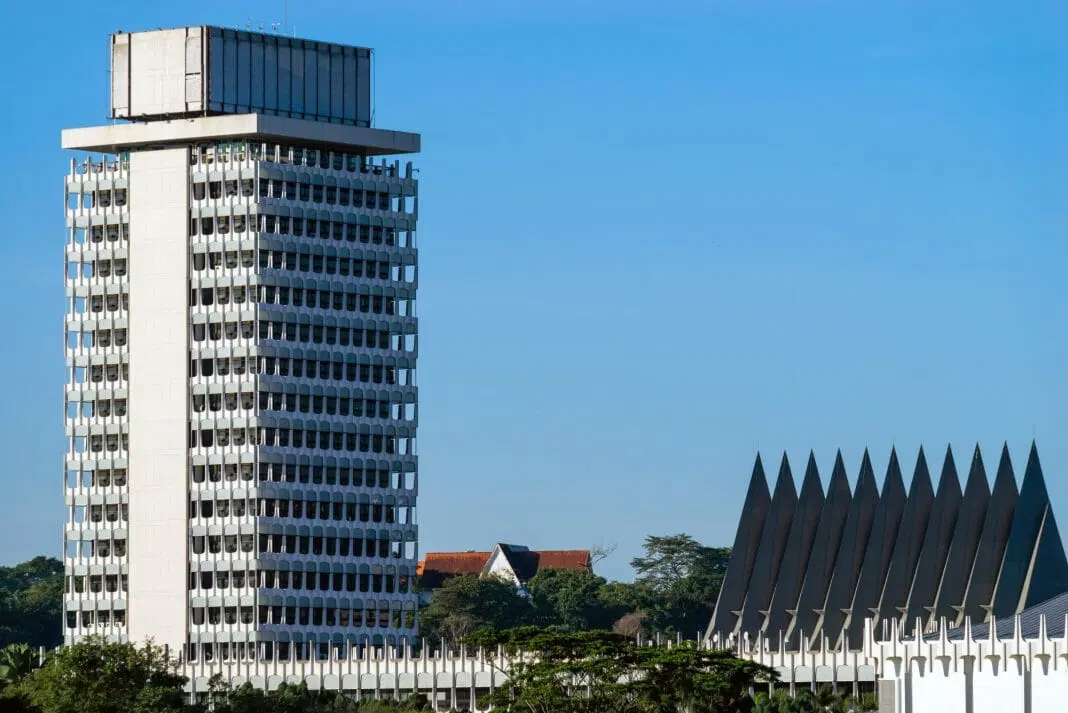 The Ministry of Human Resources (MOHR) confirmed that complaints of alleged union busting involving Flextronics Penang and XSD International Paper are still being addressed through amicable negotiations. In a written reply to Tan Hong Pin (Bakri) during the Dewan Rakyat session today, the ministry stated that the Department of Industrial Relations Malaysia (JPPM) has received […]
The Ministry of Human Resources (MOHR) confirmed that complaints of alleged union busting involving Flextronics Penang and XSD International Paper are still being addressed through amicable negotiations. In a written reply to Tan Hong Pin (Bakri) during the Dewan Rakyat session today, the ministry stated that the Department of Industrial Relations Malaysia (JPPM) has received […] - KESUMA bangun platform latihan baharu untuk pekerja
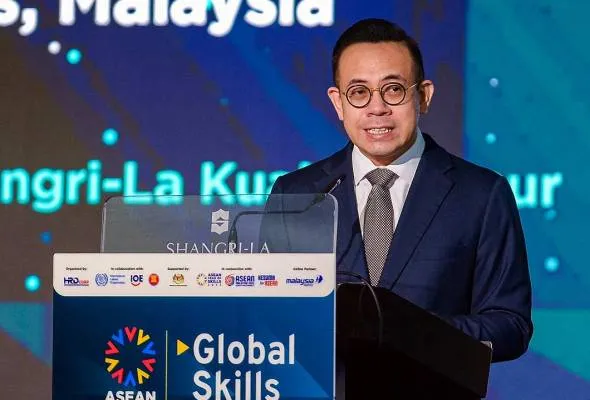 KUALA LUMPUR: Kementerian Sumber Manusia (KESUMA) sedang membangunkan platform program latihan baharu yang diluluskan pakar industri dan boleh diakses semua lapisan masyarakat. Menteri Sumber Manusia Steven Sim Chee Keong berkata program itu akan memilih dan menghimpunkan kursus kemahiran terbaik yang ditawarkan oleh penyedia latihan dalam dan antarabangsa. “Program pendidikan untuk pekerja kita perlu mengandungi komponen […]
KUALA LUMPUR: Kementerian Sumber Manusia (KESUMA) sedang membangunkan platform program latihan baharu yang diluluskan pakar industri dan boleh diakses semua lapisan masyarakat. Menteri Sumber Manusia Steven Sim Chee Keong berkata program itu akan memilih dan menghimpunkan kursus kemahiran terbaik yang ditawarkan oleh penyedia latihan dalam dan antarabangsa. “Program pendidikan untuk pekerja kita perlu mengandungi komponen […] - NHCCE 2025 concludes three transformative days of empowering the workforce of tomorrow
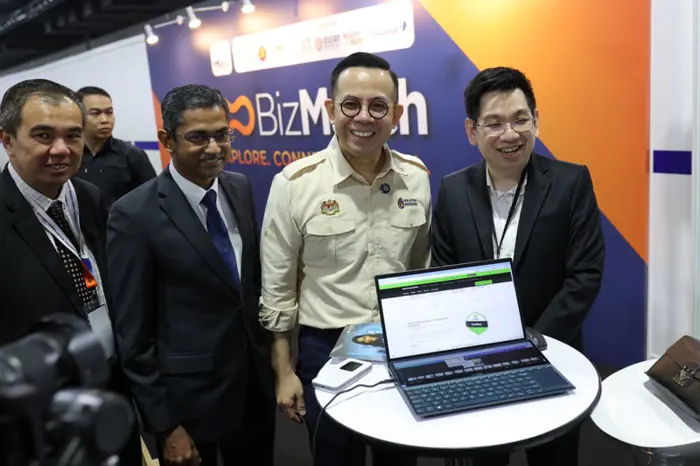 KUALA LUMPUR: The National Human Capital Conference & Exhibition (NHCCE) 2025 has concluded at the Malaysia International Trade and Exhibition Centre (MITEC), marking the end of three impactful days under the theme ‘Navigating the Human Capital Revolution’. The conference reaffirms its position as Malaysia’s premier platform for thought leadership, collaboration and innovation in the field […]
KUALA LUMPUR: The National Human Capital Conference & Exhibition (NHCCE) 2025 has concluded at the Malaysia International Trade and Exhibition Centre (MITEC), marking the end of three impactful days under the theme ‘Navigating the Human Capital Revolution’. The conference reaffirms its position as Malaysia’s premier platform for thought leadership, collaboration and innovation in the field […] - Malaysia’s worker productivity up 2.4pc per worker in 2024 as govt targets fewer foreign labour
 KUALA LUMPUR, Oct 7 — Malaysia’s worker productivity increased by 2.4 per cent in 2024, with value added per worker amounting to RM99,265 compared to RM96,914 in the previous year, according to the Ministry of Investment, Trade and Industry (MITI). Deputy Minister Liew Chin Tong said the rate was calculated based on the value of […]
KUALA LUMPUR, Oct 7 — Malaysia’s worker productivity increased by 2.4 per cent in 2024, with value added per worker amounting to RM99,265 compared to RM96,914 in the previous year, according to the Ministry of Investment, Trade and Industry (MITI). Deputy Minister Liew Chin Tong said the rate was calculated based on the value of […] - 246 aduan Union Busting diterima, KESUMA pastikan hak pekerja terbela
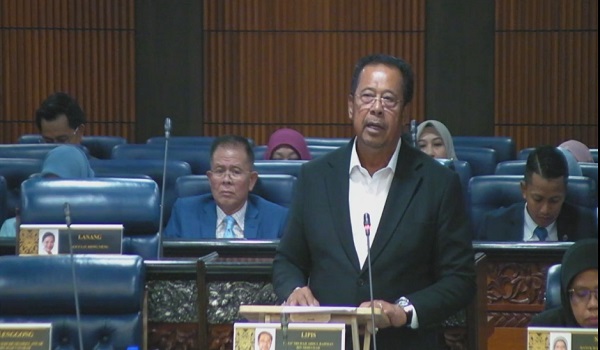 KUALA LUMPUR, 8 Oktober– Hak kebebasan pekerja menubuhkan serta menyertai kesatuan sekerja akan terus dilindungi terutama dari segi penindasan atau amalan union busting. Timbalan Menteri Sumber Manusia, Datuk Seri Abdul Rahman Mohamad berkatasejak tahun 2015 hingga 31 Ogos lepas, sebanyak 246 aduan berkaitan amalan union busting telah diterima oleh Jabatan Perhubungan Perusahaan Malaysia (JPPM). “Berdasarkan […]
KUALA LUMPUR, 8 Oktober– Hak kebebasan pekerja menubuhkan serta menyertai kesatuan sekerja akan terus dilindungi terutama dari segi penindasan atau amalan union busting. Timbalan Menteri Sumber Manusia, Datuk Seri Abdul Rahman Mohamad berkatasejak tahun 2015 hingga 31 Ogos lepas, sebanyak 246 aduan berkaitan amalan union busting telah diterima oleh Jabatan Perhubungan Perusahaan Malaysia (JPPM). “Berdasarkan […] - TVET just got a major upgrade with RM7.9b in Budget 2026 to power Malaysia’s high-tech future
 KUALA LUMPUR, Oct 11 — The increased allocation for Technical and Vocational Education and Training (TVET) to RM7.9 billion under Budget 2026 reflects the government’s strong commitment to nurturing a skilled, high-income and innovative workforce. National TVET Council (MTVET) member Howard Lee Chuan How said the focus on key sectors such as Artificial Intelligence […]
KUALA LUMPUR, Oct 11 — The increased allocation for Technical and Vocational Education and Training (TVET) to RM7.9 billion under Budget 2026 reflects the government’s strong commitment to nurturing a skilled, high-income and innovative workforce. National TVET Council (MTVET) member Howard Lee Chuan How said the focus on key sectors such as Artificial Intelligence […] - Budget 2026 introduces enhanced EPF scheme for gig workers, self-employed to boost savings
 PETALING JAYA: The Employees Provident Fund (EPF) will roll out several initiatives next year to boost retirement savings and social protection, particularly for informal and self-employed workers, under Budget 2026. Prime Minister Datuk Seri Anwar Ibrahim announced that the government will introduce i-Saraan Plus, an enhanced voluntary contribution scheme designed for gig workers, e-hailing drivers […]
PETALING JAYA: The Employees Provident Fund (EPF) will roll out several initiatives next year to boost retirement savings and social protection, particularly for informal and self-employed workers, under Budget 2026. Prime Minister Datuk Seri Anwar Ibrahim announced that the government will introduce i-Saraan Plus, an enhanced voluntary contribution scheme designed for gig workers, e-hailing drivers […] - 2026 Budget: SMEs, microbusinesses to benefit from stamp duty relief, RM1bil digital financing
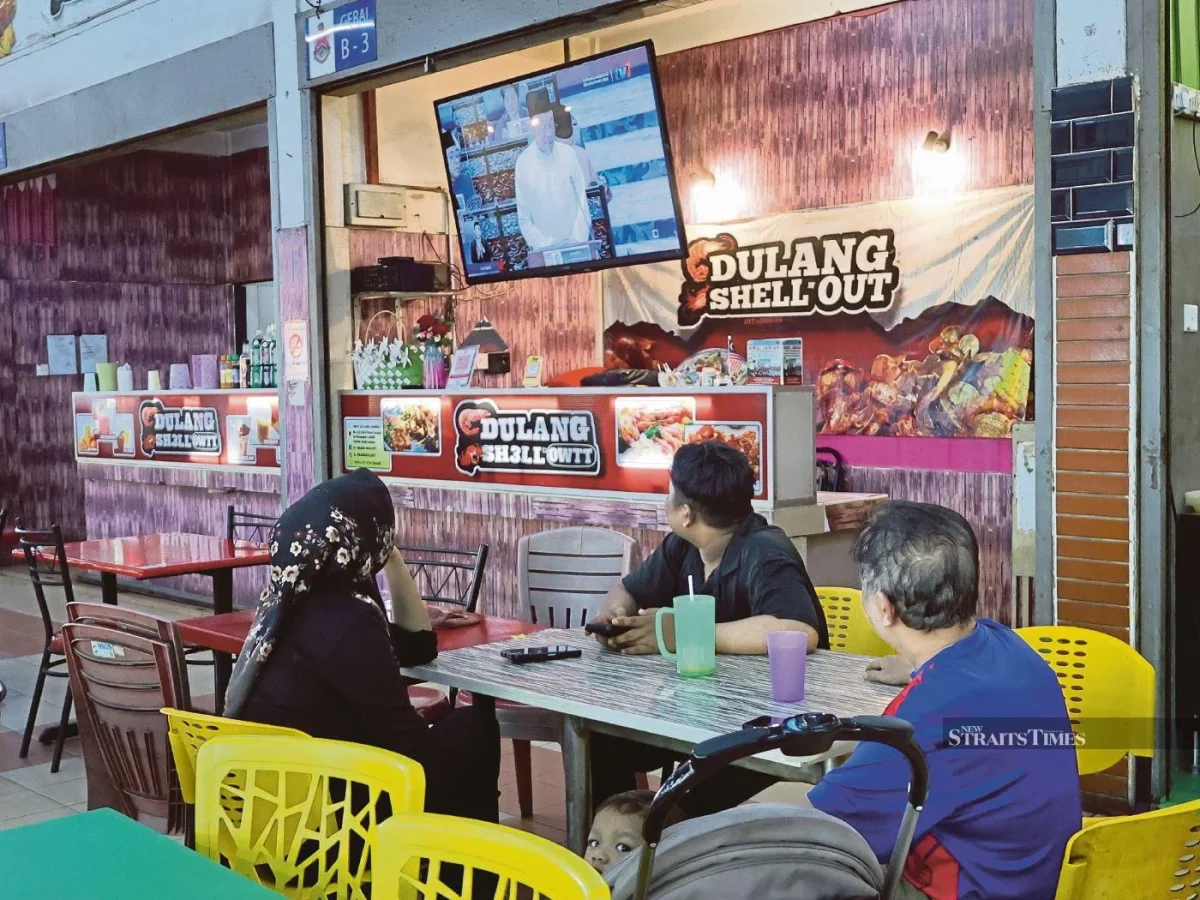 KUALA LUMPUR: The government will raise the salary threshold for employment contracts exempted from stamp duty — from RM300 to RM3,000 per month — effective Jan 1, 2026. The move, announced under the 2026 Budget by Prime Minister Datuk Seri Anwar Ibrahim in Parliament, aims to further ease the cost of doing business by reducing […]
KUALA LUMPUR: The government will raise the salary threshold for employment contracts exempted from stamp duty — from RM300 to RM3,000 per month — effective Jan 1, 2026. The move, announced under the 2026 Budget by Prime Minister Datuk Seri Anwar Ibrahim in Parliament, aims to further ease the cost of doing business by reducing […] - Govt rules out gig firms’ mandatory contributions to Socso, for now
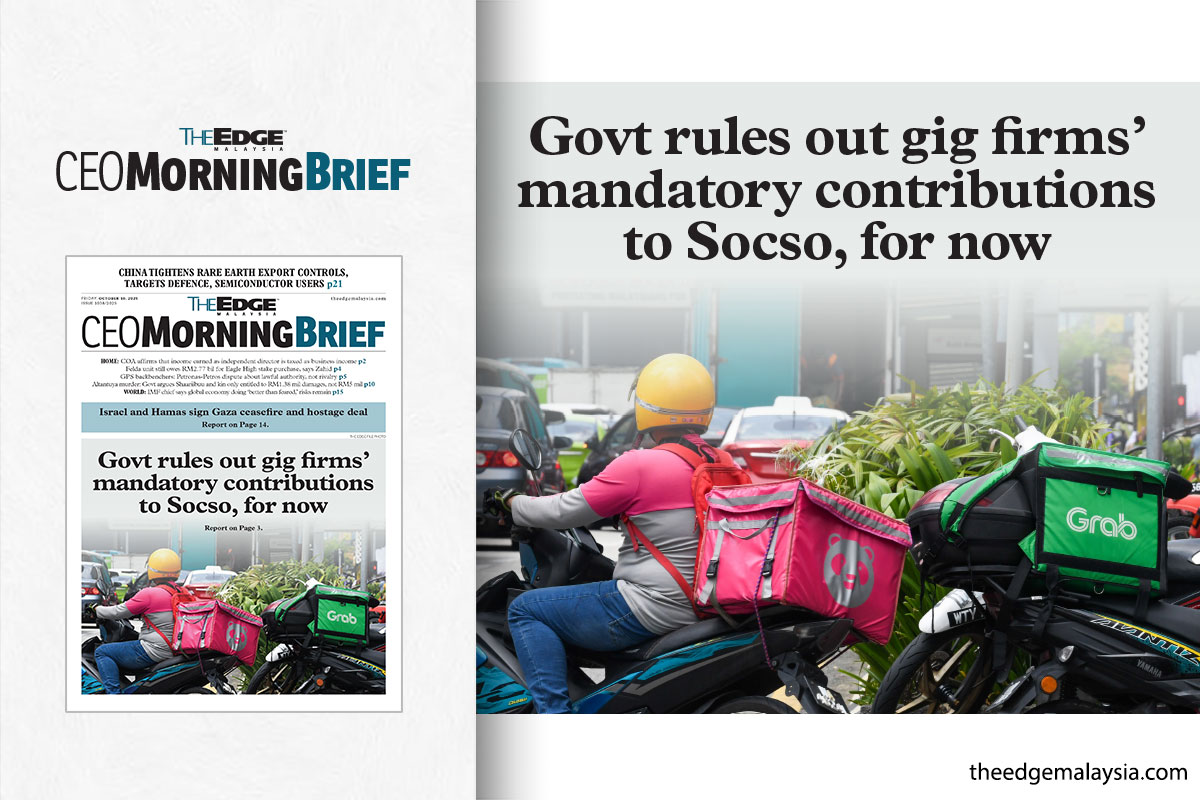 KUALA LUMPUR (Oct 9): Malaysia has no immediate plan to compel gig economy platforms to make mandatory social security contributions though the government will consider the proposal for future policy improvements. The government recognises the need to preserve the flexibility and independence that define gig work, which distinguishes gig workers from conventional full-time employees under […]
KUALA LUMPUR (Oct 9): Malaysia has no immediate plan to compel gig economy platforms to make mandatory social security contributions though the government will consider the proposal for future policy improvements. The government recognises the need to preserve the flexibility and independence that define gig work, which distinguishes gig workers from conventional full-time employees under […]
